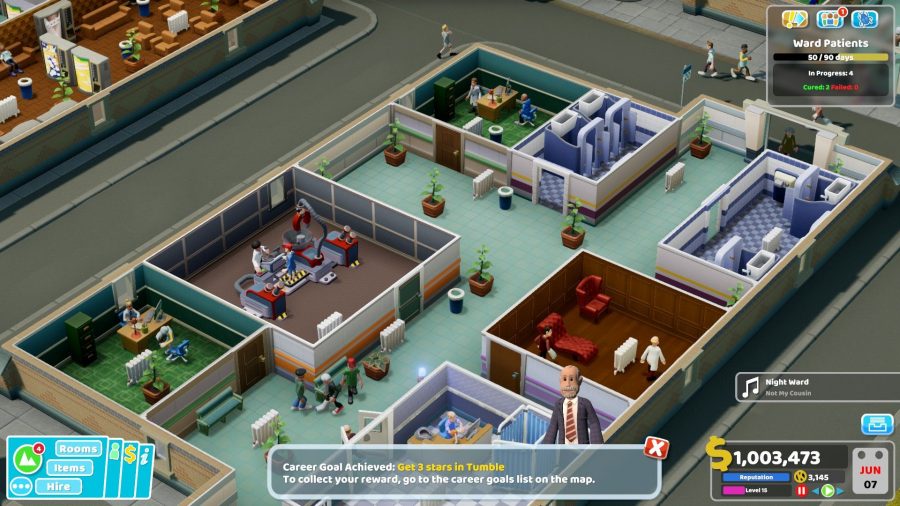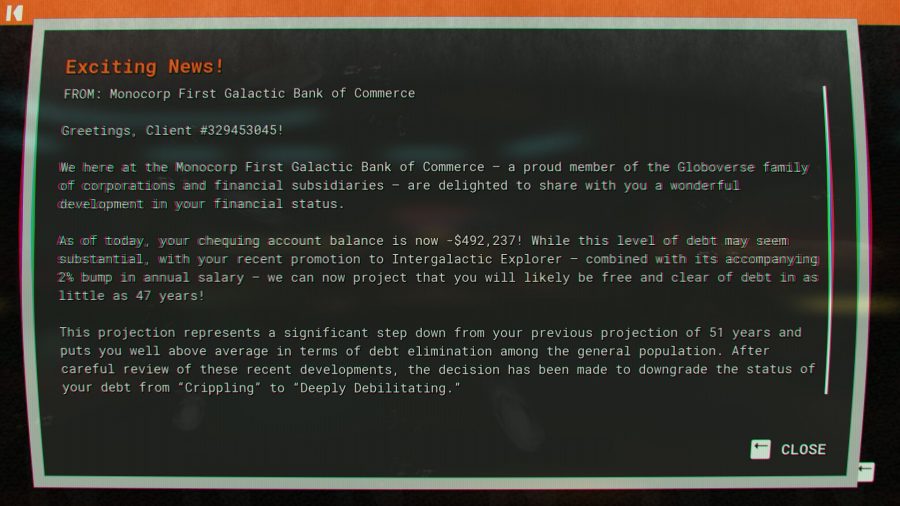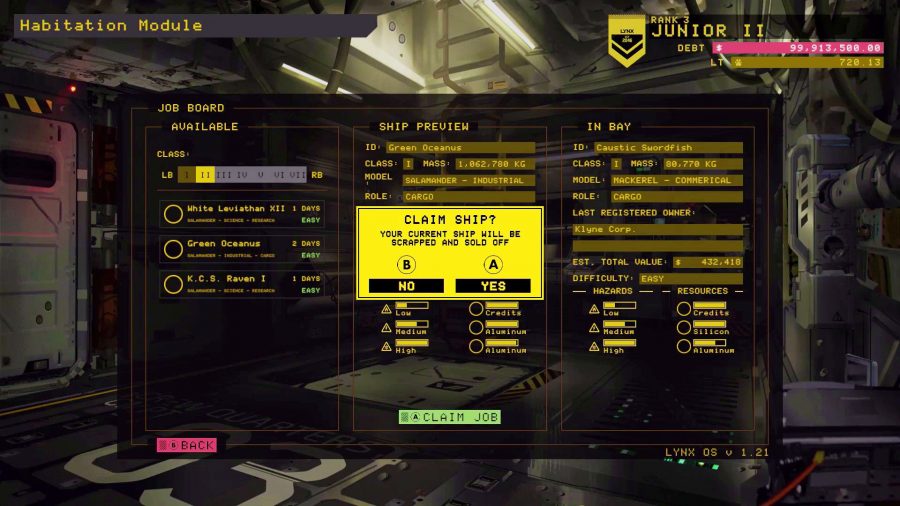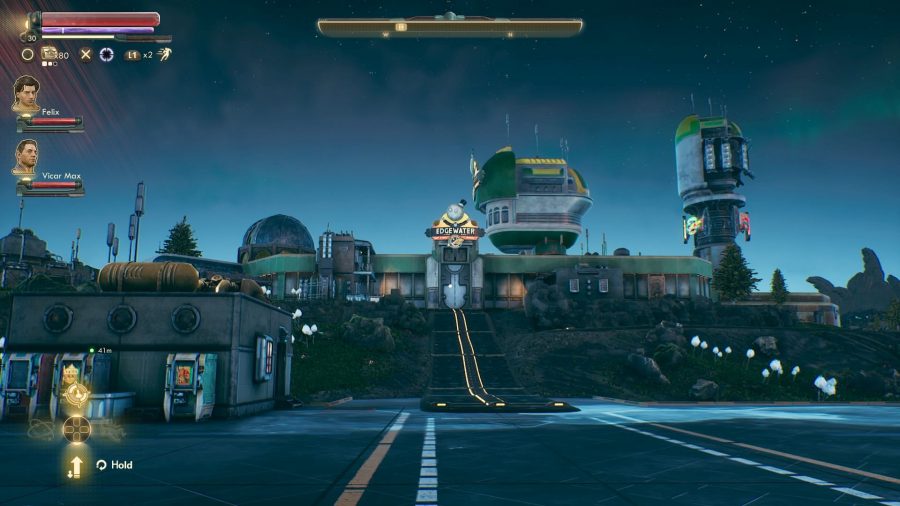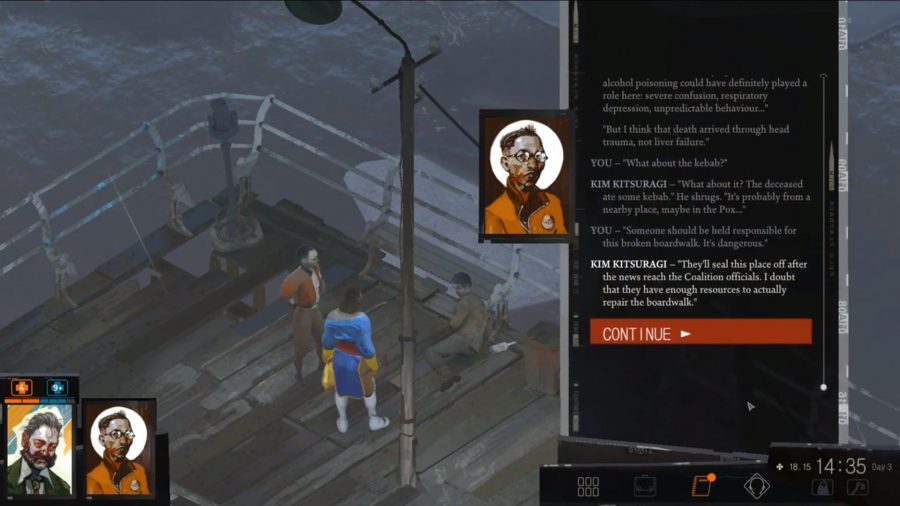Whatever your politics, it's fair to say that capitalism is having A Bit of A Moment. The 2008 financial crisis was a painful recent reminder of how the bursting of a massive bubble can affect us all – even those who had nothing to do with inflating it – and has led many voters to contemplate alternative ideas and the politicians who represent them.
Sure, Bernie Sanders may have just lost the Democratic nomination – again – and in the UK, Jeremy Corbyn got soundly defeated in a general election a few months ago. But not so long ago they would've never got as far as they did, and as a new generation of young socialists such as Alexandria Ocasio-Cortez show, they're not alone.
Inevitably and necessarily, our culture has reflected this conversation, and videogames are no exception. There's been a trend of recent games calling attention to the more harmful effects of capitalism, from light-hearted indies like Two Point Hospital to triple-A productions like The Outer Worlds. Some satires are more effective than others, though, and if satire is going to do its job, it needs to be crystal clear who the target is and why.
Labour plays a key role in capitalism, and thus appropriately makes up the nuts and bolts of Two Point Hospital, a sim where you must build and manage a hospital to handle whatever illnesses people have – and make a profit from them. The lifeblood of any hospital you make is the staff that operate it, and of course, they cost money.
The rub here is that you need to make a profit, or you’ll have to close. Building the value of your hospital is also a thing you need to do, and people represent a slice of this value, making them indistinguishable from rooms and equipment in the game, except for the need to continue to pay them. It’s a fair illustration of dehumanisation in that sense, but the game remains unpointed in its humour and mechanics. Yes, profit matters in the game, but it’s balanced by needing to cure a certain number of people, too. The whole of Two Point Hospital never adds up to an overall message, but rather depicts the reality of the USA’s health care system and plays it for laughs – the quips that the hospital intercom intermittently spits out merely chuckle at the status quo, without ever really challenging it.
A better take on how American health care is entangled with corporate interests is Big Pharma, in which you build an assembly line to manufacture medicine. Through a rigorous process of refining and upgrading, you’ll build equipment that will make pills to cure symptoms, though there can be side effects at certain levels of potency.
But it’s not as simple as making the best medicine you can. Again, you’re chasing profits, with only one or two scenarios concerned with the quality of the product you put out. Most of the missions in Big Pharma are solely concerned with making money, incentivising you to pump out sub-optimal medicine if doing so will turn more of a profit, or flooding the market with meds so fast that competing corporations can’t grab a share. The biting commentary isn’t expressed explicitly, but rather in these profit-first mechanics. You’re encouraged to mitigate side effects only insofar as doing so makes more money. It’s a sharp critique of the health care industry that tricks you into the mindset of a greedy corporation before you know it.
Journey to the Savage Planet, The Outer Worlds, and Hardspace: Shipbreaker all combine a thematic scenario with pointed writing to sharpen their satire of capitalist ideals. All three envision a future in which rank-and-file workers become indentured servants to corporations intent on exploring outer space and consuming its resources.
For Journey to the Savage Planet, though, these themes skulk around the edges, found in emails you can read at your terminal or, like Two Point Hospital, in quips that your computer companion will occasionally fire off. It’s amusing enough if you go looking for it, but developer Typhoon Studios never puts this kind of commentary centre stage, and is instead content to merely let it colour a Metroid Prime-like exploration of a somewhat open environment. You’re never really given much space or reason to reflect on how screwed up this corporation is to send you to a remote place in the universe just to be the guinea pig for a new source of exploitation.
Both Journey to the Savage Planet and Two Point Hospital raise a wry smile and a snort of laughter in their critiques, but nothing more. They’re not committed to their satire, instead using it as window dressing. That’s their decision, but it renders the satire toothless for me. Effective satire is relentless and comes from a place of determined intent to expose the faults of its target – in this case, the hurt that capitalism can cause in real life, especially when unchecked.
Hardspace: Shipbreaker is set to commit fully to this premise when it enters Steam Early Access this summer. You play a blue-collar ship scrapper, desperate to escape an overcrowded Earth for a better life on its colonies – one of the huddled masses yearning to breathe free, one might say. You beat millions of other applicants to a dream job salvaging ships for the Links Corporation, only to discover it’s a bit of a con: the corp has paid for your equipment and transportation and slapped you with a debt of millions. To pay it off, you need to work, dodging exploding fuel lines or the violent ejection of debris from pressurised cargo holds, as you break derelict spacecraft down into sellable scrap. It’s dangerous work, inspired by real shipbreakers working in places like the coast of India on washed-up warships. Your remaining debt is shown in your habitation module – a constant, depressing reminder of the burden you face and your negative financial value. By the way, US consumer debt exceeded $14 trillion in February – a new record.
The Outer Worlds casts capitalism not so much as the spectre that haunts everything as much as the monster elephant in the room that keeps crushing people under its feet. You’re given real moral quandaries caused by corporations, and that capitalism cannot be realistically untangled from.
Early on, you’re given a choice to divert power from a corporate town to a settlement of deserters, and though there’s a way to make everyone happy if you’re canny, on its face, you see first-hand how enmeshed corporations are with people’s lives and that, even if you just want to burn it all down, capitalism and corporations will still destroy lives on their way out if not handled with care. Supply chains are still under the sway of the old system, and without the network of commerce to provide food and medicine, the colonists will basically be stranded to fend for themselves. If you divert the power to one settlement, the other will have a hard time unless you can convince everyone to work together. You need to plan for what comes next to truly break free of capitalism’s grasp.
That there’s a somewhat ideal outcome hidden in these choices should be a hopeful gesture, and indeed, a call to action, as all good satire should be. Just as protesters shouldn’t go on a single march and decide their job is done, satire shouldn’t limit itself to making fun of its target – it can also be a signpost towards where we need to go.
Disco Elysium is one of the most politically vocal games of recent years, and employs many of the techniques mentioned above. It lets you endorse a range of political positions – including ultraliberal economics – and because it likes to make fun of the player, it has satirical points and scornful words for all of them. This might lead you to wonder if it takes a one side or if it’s gaming’s South Park, nihilistically poking fun at everyone. Until you play the working-class woman side quest.
Related: Check out the best RPGs on PC
After a bizarre and inherently videogamey conversation that only arises because you, the player, can’t help but bother every NPC you come across, you’re led to a body – a man who suffered a fatal accident after putting his foot through a pier. ‘Working class’ is the game’s foremost adjective for him and his wife; there’s no explicit attack on capitalism, but the entire quest is redolent with the kind of cutting injustices that only impoverished communities face. “I doubt they have enough resources to repair the boardwalk”, notes Kim of the dangerous, rotten pier. Your subconscious points out that he could’ve “easily disappeared into the sea through that hole,” forgotten by the authorities, and his family would forever wonder where their husband and father went.
Even you, the player, can decide to leave the case to someone else and refocus on the main investigation. You must choose to care. If you do so, the conversation where you break the news to his wife, in her tiny apartment with newspapers pinned to the windows because the family can’t afford curtains, is harrowing.
More like this: Check out the best long reads on PCGamesN
Like Two Point Hospital and Journey to the Savage Planet, the systems that have allowed this abject poverty to occur are left to lurk in the wings – at least for the duration of this quest – but unlike them, the tone invites us not to laugh but to exercise our empathy: what will happen to the family now? What has caused them to be in this situation? And crucially, how can we help? What consequences of our actions will we need to deal with? These are questions that these games help us ponder.

